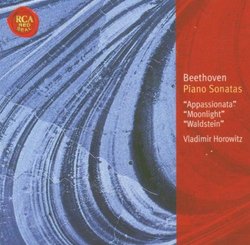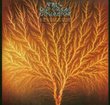| All Artists: Ludwig van Beethoven, Vladimir Horowitz Title: Beethoven: The Appassionata, Moonlight and Waldstein Piano Sonatas Members Wishing: 0 Total Copies: 0 Label: RCA Release Date: 10/12/2004 Album Type: Original recording remastered Genre: Classical Styles: Chamber Music, Forms & Genres, Sonatas, Historical Periods, Classical (c.1770-1830), Modern, 20th, & 21st Century, Romantic (c.1820-1910) Number of Discs: 1 SwapaCD Credits: 1 UPC: 828766231120 |
Search - Ludwig van Beethoven, Vladimir Horowitz :: Beethoven: The Appassionata, Moonlight and Waldstein Piano Sonatas
 | Ludwig van Beethoven, Vladimir Horowitz Beethoven: The Appassionata, Moonlight and Waldstein Piano Sonatas Genre: Classical
|
Larger Image |
CD DetailsSimilar CDs
|
CD ReviewsImproved Sonics in this reissue Hank Drake | Cleveland, OH United States | 03/05/2006 (4 out of 5 stars) "Vladimir Horowitz was not generally known as a great Beethoven interpreter. He played only a few scattered sonatas, the C minor Variations, and the Emperor Concerto. Horowitz seemed more comfortable in Beethoven's well known "Appassionata" than in any other of the composer's solo works. This 1959 recording (Horowitz's first in stereo) shows a sober Horowitz concentrating on the structure, rather than the drama of the first movement--no heart on sleeve hysteria here! The second movement variations are played as simply and directly as Horowitz can manage. The finale is taken at a sensible tempo--more ma non troppo than allegro. But Horowitz tends to get caught up in detail, rather than maintaining forward motion. His Sony recording, made in 1972, is more successful in this respect. The other items here were recorded in Horowitz's living room in 1956. They are in mono and the sound, though clattery and constricted, has been improved in this remastering. Horowitz recorded the ubiquitous "Moonlight" sonata three times-each time at the behest of the recording company which wanted saleable repertoire. This is by far the most successful of his three recordings. The heart of this success lies in the deeply felt first movement-by far the slowest of Horowitz's three recordings. (Legend has it that Horowitz halted production of the record to rerecord the movement which he had initially played at a faster tempo.) The dynamics here are precisely controlled so that the melody is sustained and balanced with the accompaniment. The second movement is played with melancholy grace, while the third is burning with frustration and played at an astonishing tempo. The sonata as a whole emerges as fresh and vital. The "Waldstein" is less successful. As in Arthur Rubinstein's 1954 recording, Horowitz seems to have overthought the piece. The first movement is played with portentous retards which undermine the motivic underpinning of the piece. The second movement is given with restrained dynamics. But when Horowitz unleashes his fortissimos in the finale, the sound becomes a bit hard on the ears (more the fault of the recording engineers than his own). Horowitz's 1972 Waldstein features stricter tempi and far better sound. Recommended for the "Moonlight" Sonata. " Moonlight Sonata incredible. C.S.R.G. | University Park, MD United States | 08/22/2007 (3 out of 5 stars) "The recording of this -- if we believe Mr Drake -- was produced when Horowitz was at the peak of his power. His personal life and battle with depression took its toll on his later recordings (post-1980). This remains a monument to the master. Sound quality is a bit airy, which also seems to be explained by Mr. Drake.
" |

 Track Listings (9) - Disc #1
Track Listings (9) - Disc #1

